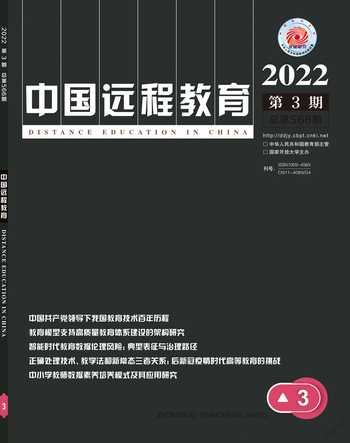Abstracts
One hundred years of educational technology development in China under the leadership of the Communist Party of China
Yonghe Zheng, Danhua Zhou, Jianhui Xiong and Jingying Wang
With the aim of turning China into an educational power as part of the revitalization of the Chinese nation, educational technology has assumed various missions in the past century since the founding of the Communist Party of China (CPC), at first serving as a medium of propagation and education of the New Democratic Reform, then contributing to the socialist revolution and construction, promoting the use of technology in education by taking advantage of technological advancements, and now pursuing intelligent education to cultivate talents for the new era. Educational technology as a discipline focuses on teaching application and has constantly evolved in combination with learning theories, from disseminating disciplinary knowledge to being applied in education, booming in computer-assisted instruction and creatively integrating with different disciplines. From the perspective of phenomenology, the hundred-year development of educational technology in China is a logical evolution of the theory of tools and means in hermeneutic relations, the theory of purpose and method in embodied relations, and the theory of transformation and shaping of its differences and backgrounds. The article also discusses the ways educational technology should be developed in the years to come under the leadership of CPC.
Keywords: the 100th Anniversary of the founding of the Communist Party of China; educational technology; goal evolution; audio-visual education; education informatization; distance education; computational education
Towards a high-quality education system supported by educational modeling
Qinhua Zheng and Bo Yu
Based on policy analysis of high-quality education system construction, the article interprets a high-quality education system from the perspectives of fostering virtue through education, supply-side reform of lifelong education system, and educational governance to ensure balanced development. It is argued that in the digital age a high-quality education system should be clearly defined in terms of concept of quality, quality elements and quality criteria and that evidence-based educational modeling is necessary which should be informed by policy, domain knowledge and data science. Such educational modeling can provide scientific, operable, comparable, and accumulative technical support for educatio- nal digitalization in the new development phase. Accordingly, this study proposes a man-machine coordination approach to educational modeling and its application scenarios. The proposed framework for constructing a high-quality education system supported by educational modeling is composed of four dimensions: overall student quality modeling with a focus on fostering virtue through education, educational and instructional modeling based on human development features, individualized lifelong learning-oriented educational supply modeling, and accurate and efficient educational governance modeling. It is hoped that this framework is conducive to enhancing the quality of an educational service system enhanced by educational big data and artificial intelligence.
Keywords: policy analysis; LAD; man-machine coordination; educational modeling; high-quality education system; fostering virtue through education; educational supply; educational governance
Ethical risks of educational data in the intelligent era: typical features and governance paths
Leilei Zhao, Li Zhang and Jing Wang
In the intelligent era supported by artificial intelligence, 5G, cloud computing and other technologies, the ethical risks of educational data and their governance attract much public attention. Typically, such risks concern privacy infringement, interest imbalance, lack of accountability, and service bias. On the other hand, barriers to ethical risk governance exist as a result of conflict between the privacy rights of teachers and students and the ethos of sharing, the anomie in the game of interests which undermines full realization of the value of educational data, governance agents’ lack of data literacy which jeopardi- zes accountability, and service bias arising from over-emphasis on the educational needs of teachers and students. In light of the above analysis, this article discusses possible paths of ethical risk governance in relation to educational data. Put specifically, first, users’ right to control their data privacy should be respected and the mechanism to prevent privacy leakage risk be optimized. Second, game of interests should be regulated and systems be established to supervise data rights and interests. Third, no efforts should be spared to cultivate data literacy and to nurture professional governance organizations. Last but not the least, a debiased mechanism for educational data service should be in place, based on dynamic demand monitoring.
Keywords: artificial intelligence; educational data; ethical risk; data governance; data privacy; data benefits; data accountability; data bias
Balancing technology, pedagogy and the new normal: post-pandemic challenges for higher education
Chrysi Rapanta, Luca Botturi, Peter Goodyear, Lourdes Guàrdia and Marguerite Koole
The Covid-19 pandemic has presented an opportunity for rethinking assumptions about education in general and higher education in particular. In the light of the general crisis the pandemic caused, especially when it comes to the so-called emergency remote teaching (ERT), educators from all grades and contexts experienced the necessity of rethinking their roles, the ways of supporting the students’ learning tasks and the image of students as self-organising learners, active citizens and autonomous social agents. In our first Postdigital Science and Education paper, we sought to distil and share some expert advice for campus-based university teachers to adapt to online teaching and learning. In this sequel paper, we ask ourselves: Now that campus-based university teachers have experienced the unplanned and forced version of Online Learning and Teaching (OLT), how can this experience help bridge the gap between online and in-person teaching in the following years? The four experts, also co-authors of this paper, interviewed aligning towards an emphasis on pedagogisation rather than digitalisation of higher education, with strategic decision-making being in the heart of post-pandemic practices. Our literature review of papers published in the last year and analysis of the expert answers reveal that the ‘forced’ experience of teaching with digital technologies as part of ERT can gradually give place to a harmonious integration of physical and digital tools and methods for the sake of more active, flexible and meaningful learning.
Keywords: emergency remote teaching; online learning and teaching; higher education; post-Covid; pedagogy; digital technologies
(英文目次、摘要譯者:肖俊洪)

